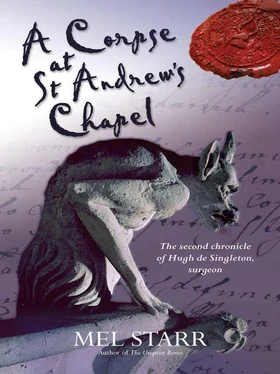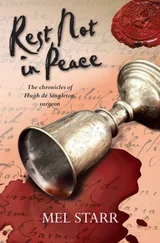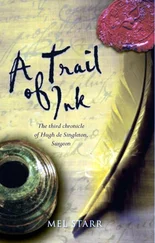Mel Starr - A Corpse at St Andrew's Chapel
Здесь есть возможность читать онлайн «Mel Starr - A Corpse at St Andrew's Chapel» весь текст электронной книги совершенно бесплатно (целиком полную версию без сокращений). В некоторых случаях можно слушать аудио, скачать через торрент в формате fb2 и присутствует краткое содержание. Год выпуска: 2010, Издательство: Kregel Publications, Жанр: Исторический детектив, на английском языке. Описание произведения, (предисловие) а так же отзывы посетителей доступны на портале библиотеки ЛибКат.
- Название:A Corpse at St Andrew's Chapel
- Автор:
- Издательство:Kregel Publications
- Жанр:
- Год:2010
- ISBN:нет данных
- Рейтинг книги:5 / 5. Голосов: 1
-
Избранное:Добавить в избранное
- Отзывы:
-
Ваша оценка:
- 100
- 1
- 2
- 3
- 4
- 5
A Corpse at St Andrew's Chapel: краткое содержание, описание и аннотация
Предлагаем к чтению аннотацию, описание, краткое содержание или предисловие (зависит от того, что написал сам автор книги «A Corpse at St Andrew's Chapel»). Если вы не нашли необходимую информацию о книге — напишите в комментариях, мы постараемся отыскать её.
A Corpse at St Andrew's Chapel — читать онлайн бесплатно полную книгу (весь текст) целиком
Ниже представлен текст книги, разбитый по страницам. Система сохранения места последней прочитанной страницы, позволяет с удобством читать онлайн бесплатно книгу «A Corpse at St Andrew's Chapel», без необходимости каждый раз заново искать на чём Вы остановились. Поставьте закладку, и сможете в любой момент перейти на страницу, на которой закончили чтение.
Интервал:
Закладка:
I have enough experience of nettles that I made no attempt to penetrate the brambles. I contented myself with poking about the fringe, using my stick to push the stems apart so as to peer into the center of the brambles. It was enough.
A close inspection showed several places where the stems of the stinging vegetation were broken, the new leaves on these stalks wilting toward the ground. I pushed my stick under some of these and lifted the broken canes to the late afternoon light. On one of these stalks I saw a wisp of black. I flailed away with the stick until the stem I sought broke free of the soil and I could pull it to me.
At first I could not determine what it was I saw fixed to the bramble thorn. But when I drew it close I found myself inspecting a tuft of black wool. Henry atte Bridge, when he was found, wore brown and grey. No black. I had found, I was sure, some remnant of his killer. But perhaps not. There was a man in the wood that evening when Henry attacked me. He called out to him. Did this bit of wool come from that man; a friend and cohort perhaps? Or did another run headlong through these nettles and brambles and leave this mark of his passing? Were there two men in the wood that night, or three?
Before I left the wood I set myself another task. The new leaves of the nettle are a pleasing addition to a soup or stew. I plucked from the fringe of the patch enough to fill my pouch. The castle cook, I knew, would appreciate the gift.
After supper I retired to my chamber to ponder three scraps of wool; two of blue and one of black. I knew the origin of the blue fragments. Black wool is most often found draping priests and clerks and those who take holy orders. Why would such a one leave part of his robe stuck to a thorn in the forest? The color of a man’s garb has little to do with where he may be found. A man may stumble into a patch of nettles no matter what he wears. So had I a clue to the death of Henry atte Bridge or not? I could not tell. All I knew of a certainty was that I had found three woolen fragments. If they spoke, they whispered so softly I could not hear their message.
Chapter 8
Walking the parapet of Bampton Castle became a common evening pastime. The exercise settled my mind for rest. And as I walked I might puzzle out a solution to the mystery of Henry atte Bridge’s death, although, truth be told, compassing a pile of stone brought me no nearer an explanation of that business. I was but going round in circles, mentally and physically. If walking was to direct me to a murderer, I would need to choose a path outside the castle walls.
I questioned Thomas atte Bridge. The man could offer no reason for his brother’s death. Or would offer no reason, if he could. The man seemed resentful of his dead brother. A glance about at Thomas’ hovel while we spoke explained that sentiment. Why two brothers of similar circumstance should live so differently did not then occur to me.
I attended mass on Sunday no closer to discovering a killer than when Thomas de Bowlegh assigned me the task. I did not wish to explain my failures to the vicar, so hastened from the church when Father Thomas had recited the final prayers and Simon Osbern pronounced the blessing.
I was too slow. Thomas de Bowlegh hailed me from the porch as I walked through the lych gate. I had hoped to leave the churchyard unseen in the press of the retiring congregation.
“What news, Master Hugh?” the vicar panted as he hastened across the churchyard. I told him of the wisp of black wool I’d found in the nettles and watched his lip curl as I did. I wondered at this.
As I completed the tale Simon Osbern appeared at the porch, watching his departing congregation and basking in the spring sun. Father Thomas saw him there and called him to us.
“Simon…your cook flavored his soup with nettle leaves Monday when we supped together, did he not?”
“Aye, he did so.”
“Whereaway did he find them?”
“Oh, I sent him to the wood where we found poor Henry atte Bridge. There is a patch there, growing up through blackberry brambles. I saw it when we searched last week and thought then ’twould be worth gathering a sack full of the leaves for the table.”
“What does your cook wear?” Father Thomas then asked — a question which was surely not expected and brought a look of surprise to Simon Osbern’s rotund face.
“Why…an old robe of mine, cut down as a surcoat.”
“Black, is it not?”
“Aye. Why do you ask this?”
Father Thomas turned to me. He expected me to provide the explanation to Father Simon, so I did.
“I found a tuft of black wool caught on thorns in the wood you spoke of. And the nettle stems were somewhat broken and disordered. I thought it was a thing which might lead to a killer, but I see now ’twas but preparation for your dinner.”
“There is no other progress to report?” Father Simon frowned.
“None, I fear. Wait…there is the arrow.”
“Arrow?” the vicars chorused.
“Nothing to do with the crime, I think. I found a new-broken arrow in the wood last week, near where Henry’s body lay. Some poacher escaped the verderer’s watch and took a deer, is my guess.”
“So near the town?” Father Simon asked skeptically.
“What better place?” Father Thomas replied. “The verderer would not expect a poacher in such a wood.”
“And I can find no better explanation,” I agreed. “An arrow plays no part in this business, and I can discover no other reason for one to be found lying broken on the forest floor.”
The discovery of that would come sooner than I might have guessed.
Father Ralph sauntered up as I took leave of the vicars. I saw them standing by the lych gate, deep in conversation, as I turned from the churchyard to make my way down Church View Street. Father Simon glanced up in my direction as I turned the corner, met my eyes, then turned again to his companions. I was too far from them to hear their conversation but I suspect my failure to find a killer was significant in their discussion.
The castle cook provided a dinner worth remembering that day. The parsley bread was filled with currants, there was duck with milk and honey, pork in spiced syrup, and a cherry pottage made from the last of the cherries dried after the harvest last year. I lingered over the meal and so was nearly late for archery practice.
There were fewer competitors this day than the week earlier. The novelty of renewed shooting wore off quickly, I think, and as the Treaty of Bretigny had brought war with France to an end — temporarily, I am sure — many saw no need to perfect a skill which might go unused.
The archers who needed practice least were most numerous this day. They enjoyed showing off their skill and besting others equally talented. Those who performed poorly the previous Sunday, and were most in need of drill, were less likely to appear this day. I understood. No one likes to be seen as incompetent before wives, children and neighbors.
A tenant of the Bishop of Exeter appeared this day, alert and eager for competition. He was a large, strong fellow, with forearms as large as my bicep. Strictly speaking he should not have been allowed to participate; the vicars of St Beornwald’s Church should have scheduled their own contest. But I saw Lord Gilbert’s men welcome the fellow warmly, so I ignored his imposition and allowed him to participate. And, indeed, he drank little of Lord Gilbert’s ale, contenting himself with the flight of his arrows.
This beefy tenant of the bishop’s was, I learned, named Andrew. The bow he strung was longer than any other at the mark by half a forearm, and thicker as well. Many men could not have drawn it, and few could hold it on target without quaking from the strain. I watched as several tried.
Читать дальшеИнтервал:
Закладка:
Похожие книги на «A Corpse at St Andrew's Chapel»
Представляем Вашему вниманию похожие книги на «A Corpse at St Andrew's Chapel» списком для выбора. Мы отобрали схожую по названию и смыслу литературу в надежде предоставить читателям больше вариантов отыскать новые, интересные, ещё непрочитанные произведения.
Обсуждение, отзывы о книге «A Corpse at St Andrew's Chapel» и просто собственные мнения читателей. Оставьте ваши комментарии, напишите, что Вы думаете о произведении, его смысле или главных героях. Укажите что конкретно понравилось, а что нет, и почему Вы так считаете.












